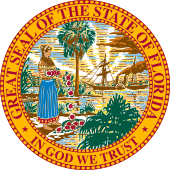Heartbeat Protection Act
| Heartbeat Protection Act | |
|---|---|
 | |
| Florida Legislature | |
| |
| Citation | Chapter n. 2023-21 |
| Enacted by | Florida Senate |
| Enacted by | Florida House of Representatives |
| Signed by | Governor Ron DeSantis |
| Signed | April 13, 2023 |
| Effective | May 1, 2024 |
| Legislative history | |
| First chamber: Florida Senate | |
| Bill citation | Senate Bill 300 |
| Introduced by | Erin Grall |
| Passed | April 3, 2023 |
| Voting summary |
|
| Second chamber: Florida House of Representatives | |
| Passed | April 13, 2023 |
| Voting summary |
|
The Heartbeat Protection Act (SB 300) is a Florida state law passed in 2023 that criminalizes abortion after 6 weeks' gestation[1]. The law went into effect May 1, 2024 after passing in 2023. Under Florida’s current abortion ban, it is nearly impossible for most women to access an abortion.[2][3] Florida’s ban provides no exceptions for rape or incest after 15 weeks’ gestation,[4] which is only eleven weeks after a missed period.
Many experts concur that the vast majority of sexual assault victims do not report their assault[5], often out of fear of retaliation, feelings of shame and experiencing trauma, concern for having to relive their experiences before law enforcement or a court, and the need for time and space to heal and feel safe. Florida’s abortion ban has no real exception for a fatal fetal abnormality that is discovered later in pregnancy, after approximately twenty-weeks from the pregnant woman’s first missed period.[6] Florida’s abortion ban contains a very narrow exception to “save the pregnant woman’s life or avert a serious risk of substantial and irreversible physical impairment of a major bodily function - This determination must be made by two physicians, certified in writing.[4]
Florida’s ban also criminalizes the delivery of abortion pills through the mail and criminalizes telehealth appointments.[7]
Florida’s abortion ban imposes legal penalties for doctors who violate the ban by making it a third-degree felony with up to five years in prison, up to a $5000 fine, and potentially losing their medical license. The ban states that “any person who willfully performs, or actively participates in, a termination of pregnancy in violation” of the law “commits a felony of the third-degree.” Unlike many other states, Florida’s ban does not clearly exempt pregnant people themselves from criminal prosecution.[8]
The bill passed the Florida Legislature on April 13, 2023. Governor Ron DeSantis signed it into law on the same day in a meeting behind closed-doors with a few selected guests.[9][10][11]
Legislative history
[edit]

References
[edit]- ^ "Statutes & Constitution :View Statutes : Online Sunshine". www.leg.state.fl.us. Retrieved 2024-10-30.
- ^ [1]
- ^ [2]
- ^ a b "Statutes & Constitution :View Statutes : Online Sunshine". www.leg.state.fl.us.
- ^ Felix, Mabel; Sobel, Laurie; Published, Alina Salganicoff (August 7, 2024). "A Closer Look at Rape and Incest Exceptions in States with Abortion Bans and Early Gestational Restrictions".
- ^ "Statutes & Constitution :View Statutes : Online Sunshine". www.leg.state.fl.us.
- ^ "Statutes & Constitution :View Statutes : Online Sunshine". www.leg.state.fl.us.
- ^ [3]
- ^ "Florida Governor Ron DeSantis signs six-week abortion ban into law". April 13, 2023 – via www.bbc.com.
- ^ Greenwood, Max (April 15, 2023). "DeSantis faces political quagmire on abortion".
- ^ "Florida Governor Desantis signs 6-week abortion ban law". April 14, 2023 – via www.reuters.com.
